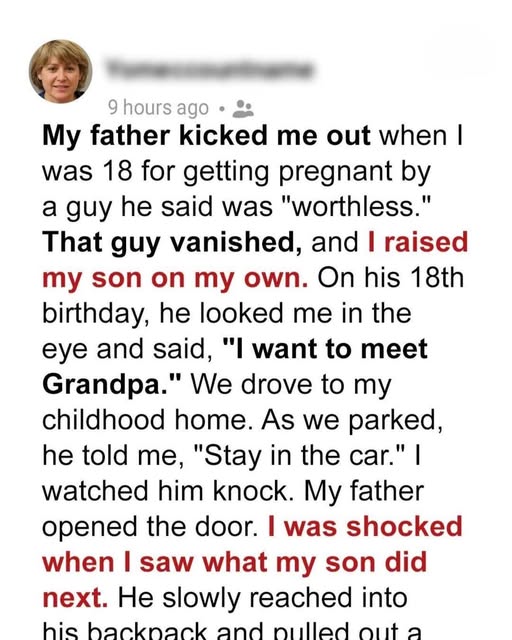I named him Liam.
From that moment on, everything changed. Every morning, I got up for him. Every decision I made was for him. Whenever I felt like breaking, he was the reason I didn’t.
Years passed in a blur of work, worry, and small victories. By the time Liam was fifteen, he had started helping out at a local auto shop. I’d watch him come home with grease on his hands and pride in his eyes. He was everything I’d ever hoped for — steady, kind, hardworking, and full of quiet determination.
By seventeen, he had turned into the kind of young man who didn’t just fix cars — he inspired people. And he did it all without ever knowing his grandfather.
When his eighteenth birthday approached, I asked him, “What do you want this year?”
I expected him to ask for tools, maybe a car part. But his answer stopped me in my tracks.
“I want to meet Grandpa,” he said.
My heart sank. The man who had turned his back on me — the man who had never called or asked about the grandson he never met. My first instinct was to protect Liam from that kind of silence. But he looked at me, steady and calm.
“I don’t want revenge,” he said. “I just want to look him in the eye.”
So we went.
The house hadn’t changed in almost twenty years — same cracked driveway, same porch light humming softly in the dusk. I gripped the steering wheel as Liam walked up and knocked.
My father opened the door. For a second, confusion clouded his face. Then recognition hit — Liam looked too much like me. Too much like him.
Without a word, Liam handed him a small box. “Here,” he said. “We can celebrate my birthday together.”
Inside was a single slice of cake.
Then Liam said something that left both of us speechless:
“I forgive you. For what you did to my mom. For what you didn’t do for me.”
My father stood frozen, his face unreadable. He’d always used silence as armor. But Liam didn’t flinch. He wasn’t afraid of it like I once was.
He continued, his voice calm and sure.
“But next time I knock on this door, it won’t be with cake. It’ll be as your biggest competitor. I’m opening my own garage. And I’ll outwork you — not out of hate, but because you made us strong enough to do it alone.”
Then he turned and walked back to the car. No anger. No bitterness. Just quiet strength.
I couldn’t move. My eyes filled with tears. My son — the baby I once held with trembling hands — had grown into a man who carried grace where I carried scars.
“I forgave him, Mom,” Liam said as we drove away. “Maybe it’s your turn.”
His words broke something open in me. Forgiveness had always felt impossible — like letting go meant excusing the pain. But that night, I finally understood. Forgiveness wasn’t for my father. It was for us.
It was freedom.
As I lay in bed, I thought about everything we’d survived — the long nights, the small apartment, the endless work, the love that held us together when nothing else did.
We weren’t broken. We were unbreakable.
My father’s rejection had once felt like the end of my story. But it wasn’t. It was just the beginning of something stronger — something rooted in resilience, grace, and love.
And maybe Liam was right. Maybe it was time to forgive. Not to forget, not to excuse — but to let go, and finally move forward.
Because sometimes, what feels like rock bottom is really the place where strength begins to grow.

